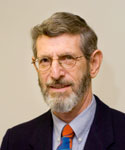 Richard Panush, MD, has been a leader and respected voice in rheumatology for six decades, serving on numerous boards and committees, editing journals and writing thought-provoking columns for The Rheumatologist. In 2010, he accepted an appointment as professor of medicine at the Keck School of Medicine at the University of Southern California in Los Angeles.
Richard Panush, MD, has been a leader and respected voice in rheumatology for six decades, serving on numerous boards and committees, editing journals and writing thought-provoking columns for The Rheumatologist. In 2010, he accepted an appointment as professor of medicine at the Keck School of Medicine at the University of Southern California in Los Angeles.
The Rheumatologist recently asked for his opinions on a few hot topics:
Question: How does the field convince more trainees, medical students and medical residents to pursue careers in rheumatology?
Answer: We need to model [the career] better. Nothing will be a more powerful inducement to others to consider careers in rheumatology than seeing us changing patients’ lives; observing us finding fun and fulfillment in doing rheumatology, be it investigative, clinical, educational or some combination of these; watching us engaged by the clinical and intellectual challenges of our discipline. [Individuals will] recognize that we exemplify the ‘compleat’ physician and live Francis Peabody’s dictum that ‘the secret of the care of the patient is in caring for the patient;’1 or notice how we rheumatologists disproportionately assume leadership roles in all aspects of medicine, ranging from laboratory science to patient care to pedagogy to educational administration to industry to outcomes research to reducing disparities of care.
In this context, I reprise some of my comments on today’s reality that the majority of our trainees are now international medical graduates: ‘We should see increasing numbers of [foreign medical graduates] as fellows and future colleagues (until or unless graduate medical education in this country is transformed), and we should certainly welcome them as colleagues. After all, we’re all just people—or, in our case, rheumatologists.’2
It is dangerous, indeed, to think otherwise.
Q: You’ve written about your concerns regarding medical training, specifically the Accreditation Council for Graduate Medical Education’s (ACGME) Next Accreditation System (NAS). Do you remain concerned, or has your outlook changed in recent years?
A: I’m disappointed with the NAS, the ‘next’ or ‘new’—now really the current—accreditation system for rheumatology training. I expressed my concerns at some length in an August 2013 article in The Rheumatologist.3
We can never be complacent, neither about our education and training, nor about any aspects of our art and science. It’s salutary to reflect on what we do and to try to improve. But neither should we reject past or present practices without reasoned review and clear evidence of inadequacy—and certainly not simply for a newer fashion or unproven hypothesis.


